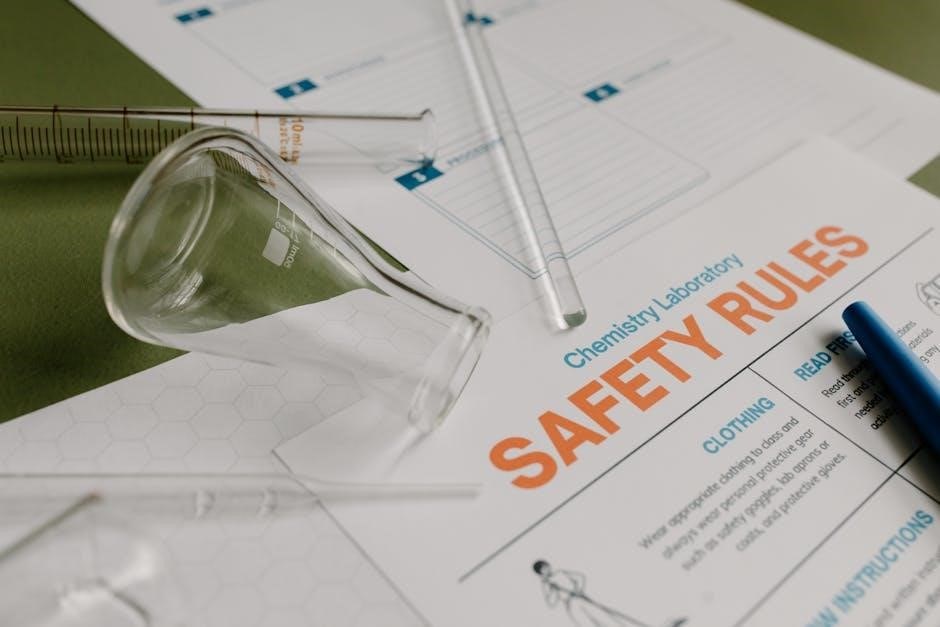The NCAA International Academic Standards Guide provides specific criteria for reviewing international student-athletes’ eligibility, focusing on graduation, core curriculum, and GPA requirements to ensure compliance with NCAA standards․
Purpose and Importance of the Guide
The NCAA International Academic Standards Guide is designed to standardize the eligibility process for international student-athletes, ensuring fairness and consistency in academic evaluations․ Its purpose is to provide clear criteria for reviewing academic credentials, core coursework, and grade-point averages from various countries․ This guide is essential for maintaining the integrity of NCAA eligibility standards while accommodating the diverse educational systems worldwide․ It serves as a vital resource for international students, educators, and NCAA member institutions, helping them navigate the complexities of eligibility requirements․ By adhering to this guide, student-athletes can seamlessly integrate into the NCAA system and compete at the highest levels․
Overview of NCAA Eligibility for International Student-Athletes
NCAA eligibility for international student-athletes involves a structured process to ensure academic and amateurism standards are met․ International students must meet core course, GPA, and graduation requirements, which vary by division․ Division I and II require both academic and amateurism certification, while Division III focuses solely on amateurism․ The NCAA Eligibility Center reviews academic credentials, ensuring they align with U․S․ standards․ International students must submit specific documentation, such as certified academic records and proof of graduation, to complete their eligibility review․ This process ensures fair competition and maintains the integrity of NCAA standards while accommodating diverse international educational systems․

Eligibility Process for International Student-Athletes
The eligibility process involves registering with the NCAA Eligibility Center, meeting academic and amateurism standards, and submitting required documentation to ensure compliance with NCAA regulations․
Step One: Registering with the NCAA Eligibility Center
Registering with the NCAA Eligibility Center is the first step for international student-athletes seeking to compete in the NCAA․ This process ensures athletes meet academic and amateurism standards․ Early registration is crucial to stay on track․ The Eligibility Center will request specific documents to review academic credentials and verify amateur status․ International students must create an account on the NCAA Eligibility Center website and provide necessary information, including academic records and proof of graduation․ An NCAA ID number will be assigned upon registration, which is essential for tracking progress․ This step is vital for determining eligibility and ensuring compliance with NCAA regulations․
Step Two: Understanding Eligibility Requirements
Understanding NCAA eligibility requirements is crucial for international student-athletes․ These standards ensure fairness and consistency in evaluating academic qualifications․ Key requirements include completing 16 NCAA-approved core courses, maintaining a minimum GPA, and graduating from high school or equivalent․ For Division I and II, both academic and amateurism certifications are mandatory, while Division III focuses on amateurism-only certification․ International students must familiarize themselves with these requirements to avoid delays․ The NCAA Guide to International Academic Standards provides detailed guidelines tailored to specific countries, helping athletes navigate the process effectively․ Meeting these requirements ensures eligibility to compete and receive scholarships, aligning with NCAA’s commitment to academic integrity and fair play․
Step Three: Submitting Required Documentation
Submitting accurate and complete documentation is essential for international student-athletes to complete the eligibility process․ Required documents include official transcripts, graduation credentials, and proof of core course completion․ These must be sent directly from the student’s school or via secure email from an authorized official․ Additional documents, such as proof of amateurism status, may also be requested․ Ensuring all records are certified and translated (if necessary) is critical to avoid delays․ The NCAA Eligibility Center reviews these documents to verify academic and amateurism compliance․ Timely submission ensures a smooth evaluation process, allowing athletes to meet deadlines for eligibility certification and scholarship opportunities․

Academic Standards for Eligibility
Academic standards ensure international student-athletes meet NCAA eligibility requirements, including core courses, GPA, and graduation credentials, to compete at U;S․ colleges and universities effectively․
Core Course Requirements
International student-athletes must complete 16 NCAA-approved core courses, including four in English, three in math, two in science, and three additional academic courses․ These courses must be completed in eight academic semesters or four consecutive years from the start of ninth grade․ The guide specifies that core courses must be NCAA-approved to ensure they meet academic rigor standards․ Country-specific policies detailed in the NCAA guide help determine acceptable equivalents for international students․ Proper completion of these courses is essential for eligibility to compete at NCAA member institutions, ensuring academic preparedness for college-level coursework․
Grade-Point Average (GPA) Calculation
The NCAA calculates the GPA of international student-athletes based on their performance in core courses․ The guide provides country-specific grading scales to ensure equitable evaluation across different educational systems․ Each student’s transcripts are reviewed and converted to a standardized 4․0 scale, reflecting their academic achievements in a consistent format․ The calculated GPA, along with core course requirements, determines eligibility for NCAA participation․ Prospective student-athletes should consult the NCAA International Academic Standards Guide for detailed criteria and specific requirements, ensuring they meet all necessary benchmarks for academic eligibility․
Graduation Credentials and Acceptable Documentation
International student-athletes must submit official graduation credentials that meet NCAA standards․ Acceptable documents vary by country and may include leaving certificates, maturity exams, or higher education entrance exams․ The guide provides country-specific lists of acceptable credentials, ensuring compliance with NCAA eligibility requirements․ All documents must be certified and submitted directly from the student’s school via an official email address․ Failure to provide valid graduation credentials may delay eligibility determination․ Prospective student-athletes should review the NCAA International Academic Standards Guide to confirm their country’s acceptable documentation and ensure timely submission of all required materials for eligibility review․

Amateurism Certification
Amateurism certification ensures international student-athletes comply with NCAA rules, confirming they haven’t received improper benefits or engaged in professional activities․ It maintains fair competition and eligibility standards․
Importance of Amateurism in NCAA Eligibility
Amateurism is a cornerstone of NCAA eligibility, ensuring fair competition and preventing exploitation of student-athletes․ It prohibits athletes from receiving improper benefits or engaging in professional activities, maintaining the integrity of college sports․ By upholding amateurism, the NCAA safeguards the educational mission and ensures a level playing field for all participants․ This principle protects student-athletes from external pressures and reinforces the emphasis on education over commercial gain․ Adhering to amateurism standards is critical for eligibility, as it preserves the purity of intercollegiate athletics and aligns with the NCAA’s commitment to fostering student-athlete success both on and off the field․
Documentation Requirements for Amateurism
International student-athletes must provide specific documentation to verify their amateurism status․ This includes proof of no professional contracts, compensation, or benefits related to athletics․ Documentation must be certified and submitted directly from the student’s school or relevant authority․ The NCAA Eligibility Center requires official records to ensure compliance with amateurism rules․ Failure to provide accurate or complete documentation may delay eligibility determination․ Schools must submit documents via official email addresses, as personal emails are not accepted․ This process ensures fair competition and maintains the integrity of NCAA amateurism standards for all student-athletes․

Country-Specific Academic Requirements
The NCAA guide outlines country-specific academic policies, detailing acceptable graduation credentials and core course requirements for international student-athletes to meet eligibility standards effectively․
Understanding Country-Specific Policies
The NCAA International Academic Standards Guide provides detailed country-specific policies to help international student-athletes understand eligibility requirements․ Each country’s academic system varies, so the guide outlines acceptable graduation credentials, core course equivalencies, and GPA calculations․ It ensures that academic documents from different countries are fairly evaluated․ For example, students from countries with GCSEs, IB diplomas, or other international qualifications can find specific guidelines․ This resource helps students and schools navigate diverse education systems, ensuring compliance with NCAA standards․ By understanding these policies, international athletes can accurately prepare their academic records for eligibility review, streamlining the process for both students and institutions․
Examples of Documentation for Different Countries
The NCAA Guide provides examples of acceptable documentation for international student-athletes from various countries․ For instance, students from the UK must submit GCSE or A-Level results, while those from Australia provide ATAR scores․ International Baccalaureate (IB) diplomas are accepted for students from IB-affiliated schools․ In Spain, the Bachillerato certificate is required․ Each country’s documentation requirements are outlined to ensure compliance with NCAA standards․ The guide also specifies how to submit these documents, often requiring official translations and certifications․ This clarity helps international athletes provide the correct academic credentials, ensuring a smooth eligibility review process․

Process for First-Year International Student-Athletes
First-year international student-athletes must meet initial eligibility requirements, submit required documents, and maintain academic standards to compete and receive scholarships, ensuring compliance with NCAA regulations․
Meeting Initial Eligibility Requirements
International student-athletes must meet specific academic and amateurism standards to compete in their first year․ They must complete 16 core courses, achieve a minimum GPA, and submit required documentation․ The NCAA Eligibility Center reviews transcripts, graduation credentials, and test scores to certify eligibility․ Students must also meet amateurism requirements, ensuring no professional experience or compensation․ Registration with the NCAA Eligibility Center is essential, and all documents must be submitted through official channels․ Meeting these requirements ensures eligibility for scholarships and participation in NCAA athletics․ Failure to comply may result in ineligibility, delaying athletic opportunities․ Proper planning and early registration are critical for a smooth process․
Maintaining Eligibility in the First Year
International student-athletes must maintain academic and amateurism standards throughout their first year to remain eligible․ They must earn required credits, maintain a minimum GPA, and adhere to NCAA rules․ Full-time enrollment is mandatory, and academic progress is closely monitored․ Failure to meet these standards may result in eligibility restrictions or probation․ The NCAA Eligibility Center reviews academic performance annually to ensure compliance․ Student-athletes must also avoid any activities that violate amateurism rules, such as receiving improper benefits․ Institutions provide support to help international athletes adapt and maintain eligibility, ensuring they can continue competing while pursuing their academic goals successfully․

Understanding Probation and Eligibility Restrictions
Probation and eligibility restrictions are measures imposed on international student-athletes who fail to meet NCAA academic or amateurism standards․ Probation typically occurs when a student-athlete’s performance falls below required thresholds, such as maintaining a minimum GPA or completing necessary credits․ Eligibility restrictions may limit participation in practices or competitions․ These measures aim to ensure students adhere to NCAA regulations and maintain academic integrity․ Understanding these consequences is crucial for international athletes to avoid jeopardizing their eligibility and to take corrective actions promptly․ institutions and the NCAA Eligibility Center provide guidance to help athletes regain eligibility and continue their academic and athletic pursuits effectively․

Role of the NCAA Eligibility Center
The NCAA Eligibility Center certifies academic and amateurism eligibility for international student-athletes, ensuring compliance with NCAA standards by reviewing documents and providing essential resources․
Overview of the NCAA Eligibility Center
The NCAA Eligibility Center is responsible for certifying the academic and amateurism eligibility of prospective student-athletes, including international students․ It reviews academic records, such as transcripts and graduation credentials, to ensure they meet NCAA standards․ The center also verifies amateurism status by evaluating documentation related to athletic participation and compensation․ For international students, the Eligibility Center provides resources and guidelines to navigate the eligibility process․ It ensures fair and consistent application of NCAA rules, enabling international student-athletes to compete at NCAA member schools․ The center plays a critical role in maintaining the integrity of collegiate athletics while supporting diversity and inclusion in NCAA programs․
How to Register and Submit Documents
International student-athletes must register with the NCAA Eligibility Center by creating an account on www․eligibilitycenter․org․ They should submit required academic documents, such as official transcripts, graduation credentials, and proof of core course completion․ Documents must be certified and emailed from an official school email address․ For non-English documents, certified translations are mandatory․ The NCAA Eligibility Center reviews these materials to determine eligibility for Division I, II, or III athletics․ Timely submission is crucial to avoid delays in the certification process․ Students should regularly check their account for updates and additional requests from the Eligibility Center․
Processing Timelines and Requirements
Processing timelines for international student-athletes vary depending on the completeness of submitted documents and the complexity of each case․ The NCAA Eligibility Center typically begins reviewing records after receiving all required documentation․ Students are encouraged to submit materials early to avoid delays․ Processing times can range from several weeks to months, especially for international cases requiring additional verification․ Regularly checking the Eligibility Center account for updates and requests is crucial․ Country-specific requirements may extend timelines, so students should review the Guide to International Academic Standards for detailed policies․ Timely submission and proactive follow-up ensure a smoother certification process․

Impact of International Student-Athletes
International student-athletes bring diversity, cultural exchange, and competitive excellence to NCAA schools, enriching campus communities and fostering global understanding through their participation in athletics and academics․
Contribution to NCAA Diversity
International student-athletes significantly contribute to NCAA diversity by bringing unique cultural perspectives, experiences, and traditions to campuses nationwide․ Their presence fosters cross-cultural understanding and collaboration, enriching both academic and athletic environments․ By competing and studying alongside domestic students, they create a more inclusive and global community․ This diversity strengthens the NCAA’s mission to promote unity and excellence in intercollegiate athletics, while also preparing student-athletes to thrive in an increasingly interconnected world․ The integration of international athletes enhances the overall collegiate experience, benefiting both individuals and institutions by cultivating a more dynamic and culturally rich learning environment․
Success Stories of International Athletes
International student-athletes have achieved remarkable success in the NCAA, excelling both on and off the field․ Many have overcome cultural and linguistic barriers to become standout performers, earning accolades such as All-American honors and conference awards․ Their journeys inspire others, showcasing determination and resilience․ For example, athletes from countries like Canada, Australia, and the UK have broken records, led teams to championships, and earned academic recognition․ These success stories highlight the NCAA’s commitment to fostering global talent and providing opportunities for international athletes to thrive․ Their achievements not only elevate their teams but also enrich the cultural fabric of their institutions․

Resources and Support
The NCAA provides comprehensive resources, including the Guide to International Academic Standards, additional support materials, and contact information for assistance, ensuring international student-athletes succeed․
NCAA Guide to International Academic Standards
The NCAA Guide to International Academic Standards is a comprehensive resource detailing eligibility criteria for international student-athletes․ It outlines core course requirements, GPA calculations, and acceptable graduation credentials․ The guide also provides country-specific documentation standards, ensuring clarity for students from diverse educational systems․ By following this guide, international athletes can understand the academic and amateurism requirements necessary for NCAA eligibility․ It serves as a vital tool for navigating the eligibility process, helping students and educators ensure compliance with NCAA standards․ Regular updates reflect changes in academic policies, making it an essential reference for prospective international student-athletes pursuing NCAA opportunities․
Additional Resources for International Students
Beyond the NCAA Guide, international students can access various resources to assist with eligibility processes․ The NCAA website offers detailed country-specific documentation requirements and FAQs․ Additionally, the NCAA Guide for the College-Bound Student-Athlete provides a broader understanding of eligibility standards․ International students can also utilize the NCAA Eligibility Center’s online portal for submitting documents and tracking progress․ The NCAA website includes links to international student-athlete success stories and tips for navigating the eligibility process․ These resources ensure international students have comprehensive support to meet NCAA requirements and achieve their athletic and academic goals in the U․S․
Contact Information for Assistance
For assistance with NCAA eligibility, international students can contact the NCAA Eligibility Center directly․ The center can be reached via email at eligibilitycenter@ncaa․org or by phone at 1-877-262-1492․ Mailed documents should be sent to NCAA Eligibility Center, P․O․ Box 259374, Madison, WI 53725-9374․ For specific inquiries about international academic standards, visit the NCAA website at www․ncaa․org․ International students are encouraged to utilize these resources to ensure compliance with eligibility requirements and receive personalized support throughout the process․
The NCAA International Academic Standards Guide is essential for ensuring international student-athletes meet eligibility requirements, providing clarity and resources for a smooth transition to U․S․ college athletics․
Importance of Adhering to NCAA Standards
Adhering to NCAA academic and amateurism standards ensures fair competition and maintains the integrity of collegiate athletics․ Compliance streamlines the eligibility process, preventing delays or ineligibility issues․ International student-athletes who meet these standards demonstrate their commitment to academic rigor and amateurism, fostering a level playing field․ Proper documentation and adherence to guidelines also safeguard against future complications, such as loss of eligibility or scholarship opportunities․ By following NCAA standards, international athletes can seamlessly transition into U․S․ college athletics, ensuring a successful and compliant collegiate career․ Compliance is crucial for both personal and institutional success in the NCAA framework․
Final Tips for Prospective International Student-Athletes
Prospective international student-athletes should register early with the NCAA Eligibility Center to ensure timely processing․ Understanding country-specific academic requirements and submitting all necessary documentation accurately is crucial․ Maintaining open communication with the NCAA Eligibility Center and adhering to deadlines will streamline the eligibility process․ Additionally, staying informed about NCAA updates and seeking guidance from school counselors or NCAA resources can help navigate the complexities․ By proactively meeting all requirements and staying organized, international athletes can successfully transition to U․S․ college athletics while ensuring compliance with NCAA standards․
